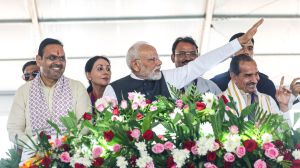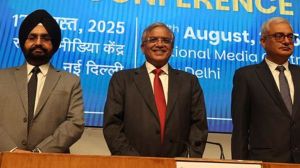Thackeray’s (in)famous last words back to haunt him
MUMBAI, July 29: It has since become his staple for every election. But when Bal Thackeray first drew what is now the Shiv Sena's trump c...

MUMBAI, July 29: It has since become his staple for every election. But when Bal Thackeray first drew what is now the Shiv Sena’s trump card, the Hindutva plank was a novelty. It was also the nucleus around which the saffron party was to build every successive election manifesto.But on Thursday, the Election Commission of India put an affirmative full stop to the Sena’s appeal for votes on the basis of religion by defranchising party chief, Bal Thackeray, for six years.
`Garva Se Kahon Hum Hindu Hai’… `Hindusthan Hinduon Ka Hai’… `Nahi Kisi Ke Bapka’, Thackeray had thundered, while campaigning for Ramesh Prabhoo, the Sena’s candidate during an Assembly by-election to the Vile Parle seat 12 years ago.
Though the election petition filed by the Congress candidate, Prabhakar Kunte, was disposed of in his favour by the Supreme Court in December 1995, the recommendation to defranchise Thackeray had been pending.
Apart from Thackeray, other party leaders like Manohar Joshi, Dattaji Salvi, MadhukarSarpotdar, Chhagan Bhujbal (who was then with the Sena) and Subhash Desai also brainwashed a jaded, but thirsting, electorate by projecting itself as the sole guardian of the rights of Hindus.
On December 9, 1987, Thackeray had said during his speech which became the subject matter of Kunte’s election petition: “Hinduism will triumph in the Assembly election and we must become honourable recipients of the victory to ward off the danger on Hinduism… elect Ramesh Prabhoo to join Chhagan Bhujbal, who is already there. You will find Hindu temples underneath if all the mosques are dug out. Anyone who stands against the Hindus should be showered or worshipped with shoes. A candidate by name Prabhoo should be led to victory in the name of religion.”
On December 10, 1987, Thackeray repeated his appeal. He had said: “We have come with the ideology of Hinduism. Shiv Sena will implement this ideology.
Though the country belongs to the Hindus, Ram and Krishna are insulted. They valued the Muslim votes morethan your votes… we do not want the Muslim votes. A snake like Shahabuddin is sitting in the Janata Party, a man like Nihal Ahmad is also in the Janata Party. So the residents of Vile Parle should bury this Janata Party.”
In his petition, Kunte had also pointed to leaflets circulated by Prabhoo in the constituency. One of them read: “Think before you vote. Remember about the saviour of Hindu religion and Shri Shivaji… remember his struggle with sword and shield (Prabhoo’s election symbol). You are under oath of the saffron flag and the existence of Hindu religion.”
In his petition filed after he lost the by-election, Kunte had urged the Bombay High Court to declare Prabhoo’s election null and void on the ground of corrupt practices under Sections 123 (2), (3) and (3A) of the Representation of the People Act, 1951. These sections, interalia, state that a candidate is not allowed to seek votes in the name of religion.
In 1989, Justice S P Bharucha of the Bombay High Court had accepted thepetitioner’s claim and had set Prabhoo’s election aside. The judge had simultaneously stated that Thackeray had violated the provisions of the Representation of the People Act and debarred him from contesting elections for six years.
Subsequently, Prabhoo filed a special leave petition in the Supreme Court in 1989. However, a full bench of apex court finally upheld the high court’s observations in 1995. Following this, it was incumbent on the Government of Maharashtra to send a recommendation to the Election Commission urging it to defranchise Thackeray. However, none was sent till June 1999.
Despite the HC order in 1989, both BJP and the Sena, alliance partners, continued to appeal for votes on the basis of religion in subsequent elections. This formed the basis of several election petitions that challenged the election of Sena candidates Suryakant Mahadik, Chandrakant Padwal, former chief minster Manohar Joshi and Abhiram Sinh in Assembly polls as well as Mohan Rawale in the 1991 Parliamentaryelections.Thackerayspeak




- 01
- 02
- 03
- 04
- 05



























